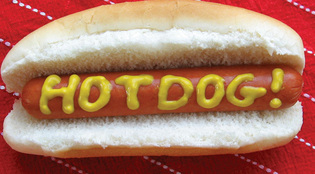 loading
loading
Arts & CultureYou Can Quote ThemYale law librarian Fred R. Shapiro is editor of the Yale Book of Quotations.  Photo illustration: John Paul Chirdon & Mary BanasView full imageThe Wall Street Journal has called him “the restless genius of American etymology.” He is an attorney in Round Rock, Texas, and his name is Barry Popik. His website, barrypopik.com, may have more good information about the history of Americanisms than the rest of the Internet put together. He disproved, among many others, the myth that Chicago’s nickname “Windy City” comes from the 1893 World’s Fair, the myth that Missouri is called “the Show-Me State” because of Willard Vandiver, and the myths that the name “hamburger” originated at Louis’ Lunch in New Haven or at Athens, Texas. He has discovered the earliest known uses of hundreds of important terms. The Yale Book of Quotations is replete with his quotation discoveries. Two of the lexical items Popik has done splendid work on relate to Yale. One turns out probably not to have a Yale origin, but the other has held up as the coinage of a Yale alumnus, a prominent one at that. Let’s start with hot dog. This expression is very widely credited to T. A. “Tad” Dorgan, a celebrated cartoonist for the New York Evening Journal. The legend is that concessionaires at New York Giants baseball games around 1900 would call out, “Get your red hot dachshund sausages,” and that Dorgan, not knowing how to spell dachshund, used “hot dog” instead in a cartoon. Tellingly, no one has ever found such a cartoon from that time period. Popik assiduously looked in college magazines of the 1890s, and found gold at Yale. It seemed the local “dog wagons”—nicknamed after the old rumor that sausage-makers used dog meat—might have given rise to the term hot dog. Here is one passage: The sleepy proprietors of the “Quick and Dirty” and the “Hot Dog on Wheels” grow to know our nightly visits so well that they call us by our first names; and the State Street canine digs up all his buried bones and retires into forests about Lake Whitney until the raw material for domestic frankfurters returns to its par value. Popik himself, however, eventually cast doubt on a Yale origination when he found an earlier citation: Even the wienerwurst men began preparing to get the “hot dogs” ready for sale Saturday night. I found a May 1893 mention in a Daily Times (New Brunswick, New Jersey) article about “‘hot dog’ peddlers, as they are familiarly called.” For now, at least, it appears Yale has no claim on “hot dog.”
Yalies have a more solid claim on the name of the New York Yankees. Early sports teams’ nicknames were unofficial, conferred by newspapers rather than owners. When Baltimore’s American League team moved to New York in 1903, it was called the Highlanders. Barry Popik has checked every New York newspaper from the time and found that the earliest appearance of “Yankees” was in the New York Evening Journal of April 7, 1904. In that issue, a headline read, “YANKEES WILL START HOME FROM SOUTH TO-DAY.” The sports editor of the Evening Journal in 1904, and the man Popik credits for the headlines, was Harry Beecher ’88. Beecher, great-nephew of Harriet Beecher Stowe, was captain of the national champion Yale football team in 1887. Hobbyists believe that the first football card ever printed was an 1887 Goodwin & Co. card—with Harry Beecher’s picture on it. To this distinction can now be added the likelihood that Beecher coined the name of the most storied franchise in all of sports.
The comment period has expired.
|
|